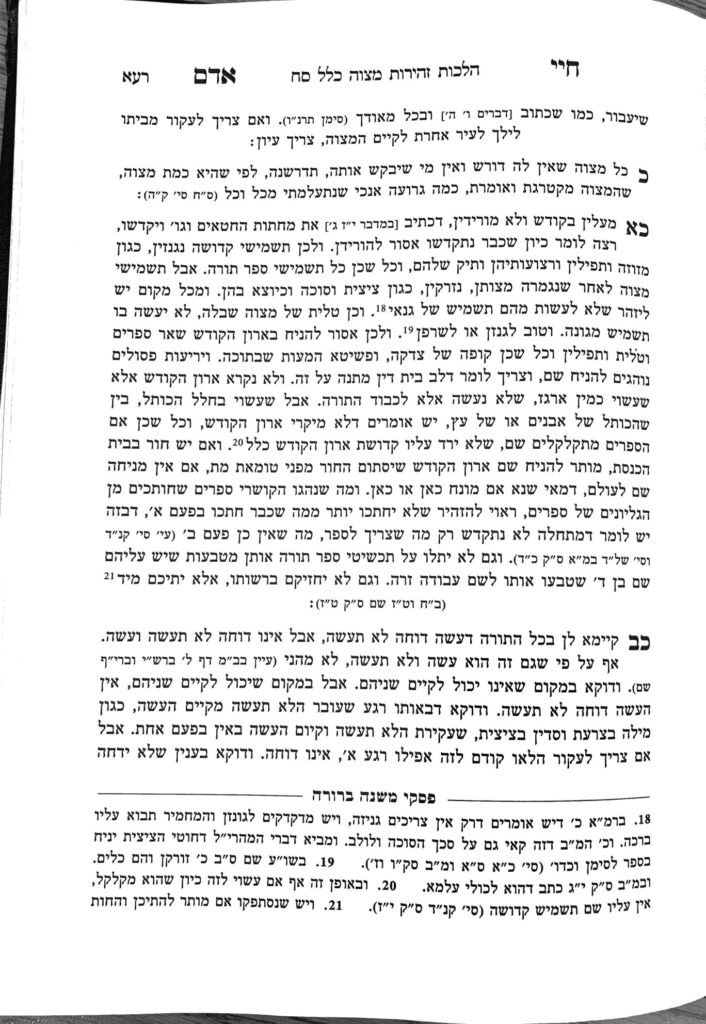We are continuing in siman 20, discussing the general question of whether a person has a chiyuv to seek out mitzvos which they are not technically chayav to perform. We left off with a Gemara in Menachos which seems to indicate that a person should seek to perform such mitzvos, because Hashem will hold them accountable at a moment of anger in shamayim.
The mitzvah of pidyon peter chamor is to redeem a male firstborn donkey with a sheep. Although it is uncommon, according to this Gemara, one may have to go out and buy a donkey in order to fulfill this mitzvah.
We learned that some rishonim understand the Gemara in Menachos as not requiring one to go out and buy tzitzis, but only to fulfill the mitzvah if one already has the tzitzis. If so, one would not have to buy a donkey solely for the purpose of the mitzvah, but only if they already own a donkey. However, according to the rishonim that one does have to go buy tzitzis, arguably one may have to buy a donkey as well. The Shulchan Aruch, in siman 24, seems to follow the opinion of the rishonim that one does not have to go out and buy tzitzis, but is only held responsible for not wearing it if they already own the tzitzis. It is certainly beautiful to show the chashivus of the mitzvah by going out and purchasing it, but the Shulchan Aruch seems to hold that one will not be held responsible at a moment of anger in shamayim.
Regarding our question about the opportunity to recite birkas hamazon, Rashi writes that Rav Katina was wearing garments which were rounded, so they were not chayav in tzitzis. It appears from Rashi that the issue with Rav Katina’s garments was that he was going out of his way to avoid the mitzvah. If so, a person who does not wash because they do not want to eat bread at the moment is not going out of their way to avoid a mitzvah, so there is no problem. It follows, however, that if one really would like to eat bread, but avoids it because they do not want the tircha of reciting birkas hamazon, they are akin to Rav Katina in the Gemara, and it would be inappropriate.
There is an argument from the Beis Halevi that the Gemara is discussing a place where people wore tzitzis, and Rav Katina specifically went out of his way to act differently than everyone else. It would follow then that in a situation in which there is no established practice, such as whether one washes for bread or not for their meals, one would not be doing anything inappropriate even if they deliberately avoid washing for bread.
The Mishnah Berurah discusses a kohen who avoids birkas kohanim, and says they will be punished at a moment of anger in shamayim. We see this concept applies to other mitzvos as well.
Rabbeinu Yonah seems to support this concept as well. He writes in Shaarei Teshuva that any time a person has an opportunity to fulfill a mitzvas asei and they do not, they will be punished at a moment of anger in shamayim. However, the sefer Shomer Mitzvah brings down from the Eshel Avraham that we are only discussing a mitzvah which, if a person does not fulfill the mitzvah now, they will miss out on the mitzvah completely. Rav Katina was always wearing garments which were exempt from tzitzis. However, if one avoids washing for bread at one meal, they will wash at a different meal, or they will wash on Shabbos, so they are not missing out on the mitzvah completely.
Someone who avoids washing because they are concerned they will not have the appropriate kavanah when reciting birchas hamazon does not fall under this discussion. However, there is an argument that a person who specifically avoids washing for bread because they consider it a tircha to recite birchas hamazon is doing something inappropriate. Although there are arguments that it is acceptable, it is something to think about.
Summary
One who avoids performing a mitzvah in which they are not chayav may fall under the category of someone who will be punished in a moment of anger in shamayim. Although there may be different arguments to exempt such a person, it is something to think about the next time one wishes to avoid a mitzvah.



